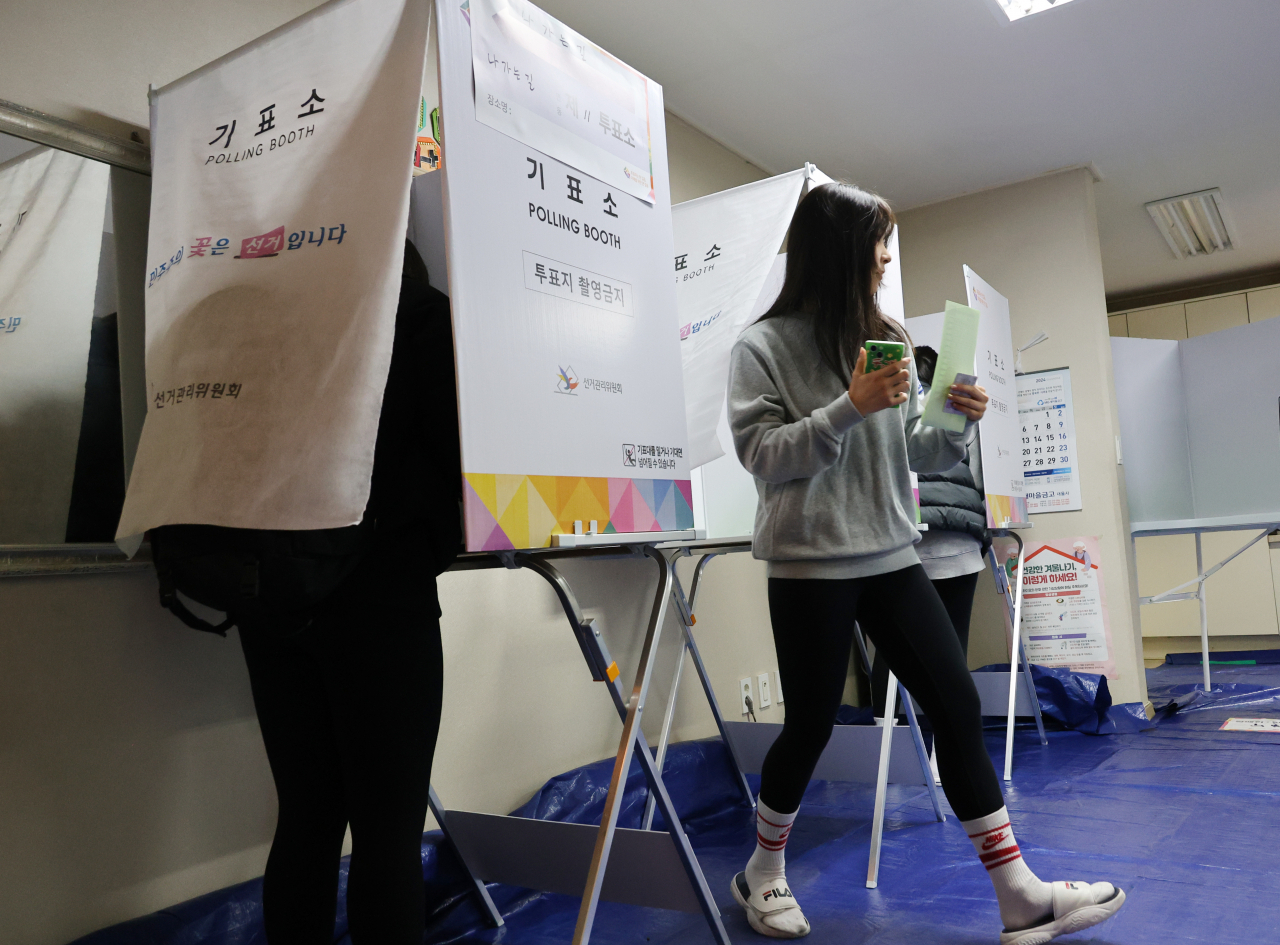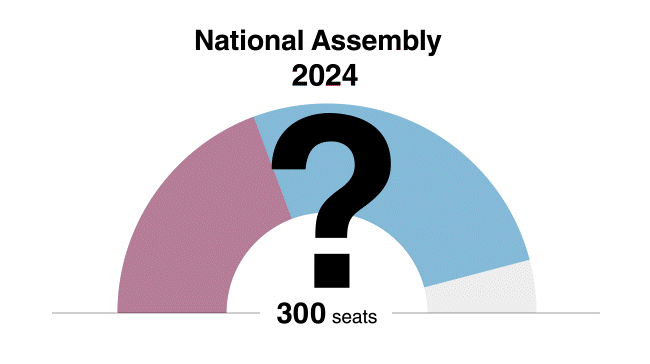Stay tuned to The Korea Herald's live coverage of the 2024 parliamentary elections.
Opposition rejoices; Humbled ruling party says will watch election results till end
April 10, 2024, 6:30 p.m.
With exit polls predicting a bigger than expected victory for the liberal opposition Democratic Party and its allies, approaching the critical two-thirds majority, on Wednesday evening, the mood among the main two parties stood in stark contrast to each other.
----------------------------------------------------------
Landslide victory projected for opposition: exit polls
April 10, 2024, 6:30 p.m.
The main opposition Democratic Party of Korea and its satellite party are expected to get close to two-thirds of the 300 seats in the National Assembly in Wednesday's general election, marking an overwhelming victory over the ruling party, joint exit polls conducted by broadcasters KBS, MBC and SBS showed.
----------------------------------------------------------
Voter turnout 64.1 percent at 5 p.m., higher than 4 years ago
April 10, 2024, 5 p.m.
The nationwide voter turnout for the 2024 general election continues to be higher than the numbers at the same time in the previous parliamentary election, marking 64.1 percent as of 5 p.m.
The figure was 1.5 percentage points higher than the 62.6 percent turnout at 5 p.m. during the 2020 general election. The final turnout of the previous parliamentary election was 66.2 percent.
Votes submitted in the two-day early voting period last week, which saw a record turnout of 31.28 percent of the electorate, were added to the official turnout figure announced by the National Election Commission at lunchtime.
----------------------------------------------------------
April 10, 2024, 4:15 p.m.
Wednesday’s general election was to pick the 300 members for the next four-year session of the National Assembly, but voters who spoke with The Korea Herald said their ballots extend beyond the next parliament, embodying their hopes and expectations for Korean politics as a whole, with President Yoon Suk Yeol included.
Here's what they had to say about the situation.
‘It's all a mess’ says 87-year-old voter leaning on cane
‘Doing my homework as a citizen’
‘Casting my judgment on current administration’
'Politics in Korea is 'driven by hatred'
‘It’s all about housing prices and inflation’
'Child care pledges are a decisive factor for me'
'Polarizing politics makes it difficult to discern what's right'
Out to block a certain party from winning
----------------------------------------------------------
April 10, 2024, 3:40 p.m.
As South Koreans vote Wednesday to elect all 300 members of the National Assembly, there are some crucial questions and pivotal issues to keep an eye on.
Here, The Korea Herald highlights three focal points before the results come in.
1. How big will the liberal presence be?
2. Which big shots will win entry to Assembly?
3. How will Cho Kuk’s new party fare?
----------------------------------------------------------
Voter turnout at 56.4% at 2 p.m.
April 10, 2024, 2 p.m.
The nationwide voter turnout for the 2024 general election on Wednesday was 56.4 percent as of 2 p.m., 3.4 percentage points higher than the 53 percent recorded at the same time in the previous 2020 general election.
----------------------------------------------------------
What more famous voters said after voting
April 10, 2024, 1:50 p.m.
Lee Myung-bak, who was president of South Korea from 2008-2013, shared his views on the current state of Korean politics after voting at a polling station in Seoul’s Gangnam district.
“It's a challenging time," he began, as he sought to answer a question about the meaning of today’s elections, and before pointing out, "Korean politics don’t really match the overall level of Korea.”
Kwon Yang-sook, wife of the late former president Roh Moo-hyun, voted at a polling site near Bongha Village in Gimhae, South Gyeongsang Province.
When asked about her feelings after voting, Kwon just said, "I hope many people participate in voting."
----------------------------------------------------------
April 10, 2024, 10:59 a.m.
As Koreans head to the polls to elect their next representatives for the legislature, here’s a quick look at the vote by key numbers.
►22: The number of the parliamentary session to be established as a result of the April 10 election.
►51.7: Length of the ballot paper in centimeters
►44.25 million: Number of eligible voters
----------------------------------------------------------
More than half of voters aged 50 or older
April 10, 2024, 9:40 a.m.

In today's general election, more than half of the eligible voters are aged 50 or older, indicating the aging trend of the Korean population.
The total number of eligible voters is 44.24 million, a 0.59 percent increase from four years earlier in 2020.
The largest age group is those aged 60 and over, who make up 31.89 percent of the electorate. The second-largest group is those in their 50s, at just under 20 percent.
Combined, individuals aged 50 and older represent 51.5 percent of the electorate, while those in their 20s, 30s and 40s account for 46.4 percent.
Female voters also outnumber male voters, comprising 50.47 percent of the electorate.
By region, Gyeonggi Province has the highest number of voters at 11.59 million, or 26.19 percent of the total.
The capital city of Seoul trails at 8.3 million, or 18.76 percent, while Busan is a distant third at 2.8 million, or 6.51 percent.
The combined voter count for Greater Seoul, which combines the capital with Gyeonggi Province and Incheon, is 22.77 million, or 51 percent of the total electorate.
----------------------------------------------------------
Voter turnout at 6.9% at 9 a.m.
April 10, 2024, 9:05 a.m.
As of 9 a.m., average voter turnout was reported to be 6.9 percent nationwide, 1.1 percentage points lower than the 8.0 percent recorded at the same time in the previous general election in 2020.
----------------------------------------------------------
Voting begins for Korea's parliament
April 10, 2026, 6:00 a.m.

Election Day voting began at 6 a.m. Wednesday nationwide for South Korea’s unicameral National Assembly, with President Yoon Suk Yeol’s liberal rivals looking set for a big win.
The 14,259 polling stations nationwide will remain open for 12 hours of voting, until 6 p.m.
Up for grabs are 300 parliamentary seats: 254 for which voters directly choose a candidate in their constituency and the remaining 46 for which voters choose a party to fill seats through proportional representation. In addition, two heads of local governments and 43 members of local legislatures will be selected in re-elections or by-elections.
Once voting concludes, sealed ballot boxes will be transported to 254 locations nationwide, where vote counting will take place.
Winners of constituency seats will likely become clear around midnight, according to the National Election Commission.
However, results for the proportional representation seats will likely take longer and could be announced early Thursday morning. This is because sorting machines cannot be used with the ballots for proportional representation, which are 51.7 centimeters in length in order to list the names of all 38 competing political parties.
A record-high 31.28 percent of eligible voters already cast their ballots during the April 5-6 early voting period.
The big question is how much the main opposition Democratic Party of Korea and its liberal allies will win by. In the outgoing assembly, the party previously had an absolute majority but fell short of the two-thirds threshold needed to override presidential vetoes.
President Yoon’s ruling People Power Party, revising up its initial projection of winning 90 to 110 seats, now predicts a maximum of 140 seats. Meanwhile, the Democratic Party is aiming for at least 153 seats.
-
Articles by Korea Herald




![[KH Explains] No more 'Michael' at Kakao Games](http://res.heraldm.com/phpwas/restmb_idxmake.php?idx=644&simg=/content/image/2024/04/28/20240428050183_0.jpg&u=20240428180321)





![[Grace Kao] Hybe vs. Ador: Inspiration, imitation and plagiarism](http://res.heraldm.com/phpwas/restmb_idxmake.php?idx=644&simg=/content/image/2024/04/28/20240428050220_0.jpg&u=)








